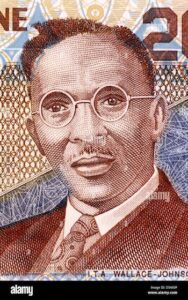
Isaac Theophilus Akunna Wallace-Johnson
*Isaac Theophilus Akunna Wallace-Johnson was born on this date in 1894. He was a Black African workers' leader, journalist, soldier, activist, and politician.
He was born to poor Creole parents in Wilberforce, British Sierra Leone, a village adjoining the capital city, Freetown. His father was a farmer, and his mother was a fish trader. Educated at Centenary Tabernacle Day School and later the United Methodist Collegiate School. Forced to leave school after two years to support his family, he worked at the customs department in 1913, where he was dismissed for organizing a labor strike. However, he was reinstated a year later after the Secretary of State for the Colonies assessed the case.
In 1916, he joined the Carrier Corps as a clerk during World War I, serving in Cameroon, East Africa, and the Middle East as part of the British infantry. After being demobilized in 1920, he worked briefly as a municipal clerk in Freetown, where he claimed to have exposed corruption leading to the arrest of top officials. After losing his municipal government job in 1926, Wallace-Johnson left Sierra Leone and served on an American ocean liner or as an engine hand for Elder Dempster Lines. In 1929, he worked for a year in Sekondi as a clerk in a trading company. All during this time, he wrote articles in the Aurora, a newspaper edited by H. C. Bankole-Bright.
Wallace-Johnson joined the UK National Seamen’s Union and reportedly edited The Seafarer, a newsletter for Black sailors. He is also believed to have joined the Communist Party. In 1930, he co-founded the Nigerian Workers' Union, the first trade union in Nigeria, alongside Communist-affiliated Frank Macauley. That same year, he represented the Sierra Leone Railway Workers’ Union at the International Trade Union Committee of Negro Workers in Hamburg, using the alias E. Richards. He was elected to the presidium and wrote for Negro Worker under another alias, Wal. Daniels, advocating for labor rights and self-organization. His involvement led colonial governments to ban the publication.
By 1933, Wallace-Johnson attended the International Labor and Defense Conference in Moscow, where he reportedly studied Marxist-Leninist theory and shared a room with Jomo Kenyatta. It was here that he became influenced by George Padmore, who was the Comintern-appointed coordinator of Communist activities among Blacks. He returned to Lagos, Nigeria, in 1933, but was deported by authorities months later for his trade union activities. Moving to the Gold Coast, he became a political activist and journalist, supporting the Scottsboro case appeal fund and pushing for workers' compensation laws after the 1934 Prestea mining disaster. His pro-communist writings and critiques of capitalism led to the Parliament of the United Kingdom passing the 1939 Sedition Ordinance, banning "seditious" literature, including Negro Worker.
The Gold Coast Independent criticized him for disrupting politics. Wallace-Johnson also had a strained relationship with Edgar Parry’s Labor Movement and was arrested on September 1, 1939, the first day of World War II. A trial was held without a jury, and Wallace-Johnson was sentenced to 12 months in prison, eventually being transferred to Sherbro Island. He was released in 1944. He returned to political activism but found the West African Youth League (WAYL) in a state of disarray, where tribal and regional issues, rather than the cause of unity that he championed, flourished. In 1945, he attended the World Trade Union Conference in London and the Fifth Pan-African Congress in Manchester, representing the Trade Union Congress and West African Youth League.
In 1950, Wallace-Johnson merged the WAYL into the new National Council of the Colony of Sierra Leone. However, he left the group in 1954 to found the United Sierra Leone Progressive Party. He remodeled himself as a Pan-Africanist and de-emphasized his earlier radicalism. He co-founded the United National People's Party in 1956. The UPP became the official opposition after a general election in 1957. Wallace-Johnson was a delegate to the independence talks in London. He died in a car crash in Ghana on May 10, 1965. His wife died in early 2008 in Freetown.